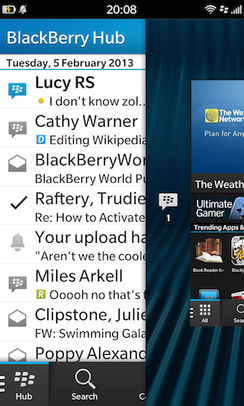 BlackBerry Hub being viewed on a BlackBerry Z10 | |
| Developer | BlackBerry Ltd. |
|---|---|
| Written in | C, C++, Qt |
| OS family | Unix-like, QNX |
| Source model | Closed source |
| Initial release | January 30, 2013[1] |
| Final release | 10.3.3.3216 / April 4, 2018[2] |
| Final preview | 10.3.3.3216 / April 4, 2018[3] |
| Available in | Multilingual |
| Update method | Firmware over-the-air, BlackBerry Link (carrier dependent) |
| Package manager | .bar (BAR) |
| Platforms | ARM |
| Kernel type | Real-time, microkernel |
| Default user interface | Graphical |
| License | Proprietary |
| Preceded by | BlackBerry OS BlackBerry Tablet OS |
| Succeeded by | BlackBerry Secure OS (Android) |
| Official website | ca |
| Support status | |
| Unsupported as of January 4, 2022 | |
BlackBerry 10 (BB10) is a proprietary mobile operating system for the BlackBerry line of smartphones, both developed by BlackBerry Limited (formerly known as Research In Motion). Released in January 2013, BlackBerry 10 is a complete rework from the company's previous BlackBerry OS software.
It is based on QNX, a Unix-like operating system that was originally developed by QNX Software Systems until the company was acquired by Research In Motion in 2010.[4] BlackBerry 10 supports the application framework Qt (version 4.8) and in some later models features an Android runtime to run Android applications. Prior to version 10.3.1, BlackBerry 10 also supported the Adobe AIR runtime.[5] The user interface uses a combination of gestures and touch-based interactions for navigation and control, making it possible to control a device without having to press any physical buttons, with the exception of the power button that switches the device on or off. It also supports hardware keyboards, including ones that support touch input.
On October 26, 2015, BlackBerry Limited announced that there were no plans to release new APIs and software development kits (SDKs) or adopt Qt version 5. Future updates, like versions 10.3.3 and 10.3.4, would focus on security and privacy enhancements only,[6][7] effectively putting the operating system in maintenance mode.[8] At the same time, the company introduced its first Android-based device, BlackBerry Priv. The BlackBerry Leap was the last smartphone released on the BB10 platform.[9] After BlackBerry Limited ceased making smartphones in 2016, its successor BlackBerry Mobile by licensee TCL abandoned the platform and only developed devices based on Android, starting with the BlackBerry KeyOne.[10]
On December 15, 2017, BlackBerry Limited announced that there would be at least another two years of support for BlackBerry 10 and BlackBerry OS devices; in August 2019, however, BlackBerry stated in a press release that they would continue to support "critical infrastructure" for BlackBerry 10 beyond the end of the year.[11] BlackBerry 10 became end-of-life effective January 4, 2022.[12]
- ^ "BlackBerry 10: Re-designed, Re-engineered, and Re-invented". BlackBerry Limited. January 30, 2013. Archived from the original on September 18, 2015. Retrieved January 7, 2016.
- ^ "BlackBerry OS 10.3.3.3216 autoloader files now available". CrackBerry. April 4, 2018. Archived from the original on April 11, 2018. Retrieved May 8, 2018.
- ^ "BlackBerry OS 10.3.3.3216 autoloader files now available". CrackBerry. April 4, 2018. Archived from the original on April 6, 2018. Retrieved April 4, 2018.
- ^ "Research In Motion to Acquire QNX Software Unit from Harman International". BlackBerry Limited. April 9, 2010. Archived from the original on September 29, 2015. Retrieved January 7, 2016.
- ^ "End of Support Notice". BlackBerry Developer. April 15, 2014. Archived from the original on January 31, 2016. Retrieved January 7, 2016.
- ^ "An update for BlackBerry® 10 Developers". BlackBerry Developer Blog. October 26, 2015. Archived from the original on January 6, 2016. Retrieved January 7, 2016.
- ^ Chen, John (January 8, 2016). "Showing Our Commitment to BlackBerry 10 at CES 2016". Inside BlackBerry. Archived from the original on February 22, 2016. Retrieved February 13, 2016.
- ^ Andrew Orlowski. "BlackBerry admits dying BB10 is in pain". www.theregister.com. Archived from the original on 2023-01-03. Retrieved 2023-01-03.
- ^ "BlackBerry announces at least another two years of support for BB10 and BBOS users". CrackBerry.com. Archived from the original on 2017-12-19. Retrieved 2017-12-17.
- ^ Kharpal, Arjun (25 February 2017). "TCL launches new $549 smartphone under BlackBerry's banner, featuring Android software". CNBC. Archived from the original on 3 January 2018. Retrieved 3 January 2018.
- ^ blogs.blackberry.com. "Our Commitment to BB10 and Some Changes to BlackBerry Legacy Services". blogs.blackberry.com. Archived from the original on 2019-08-04. Retrieved 2019-08-04.
- ^ "BlackBerry 10 and BlackBerry OS Services FAQ - End of Life". Archived from the original on 2022-01-01. Retrieved 2020-09-19.